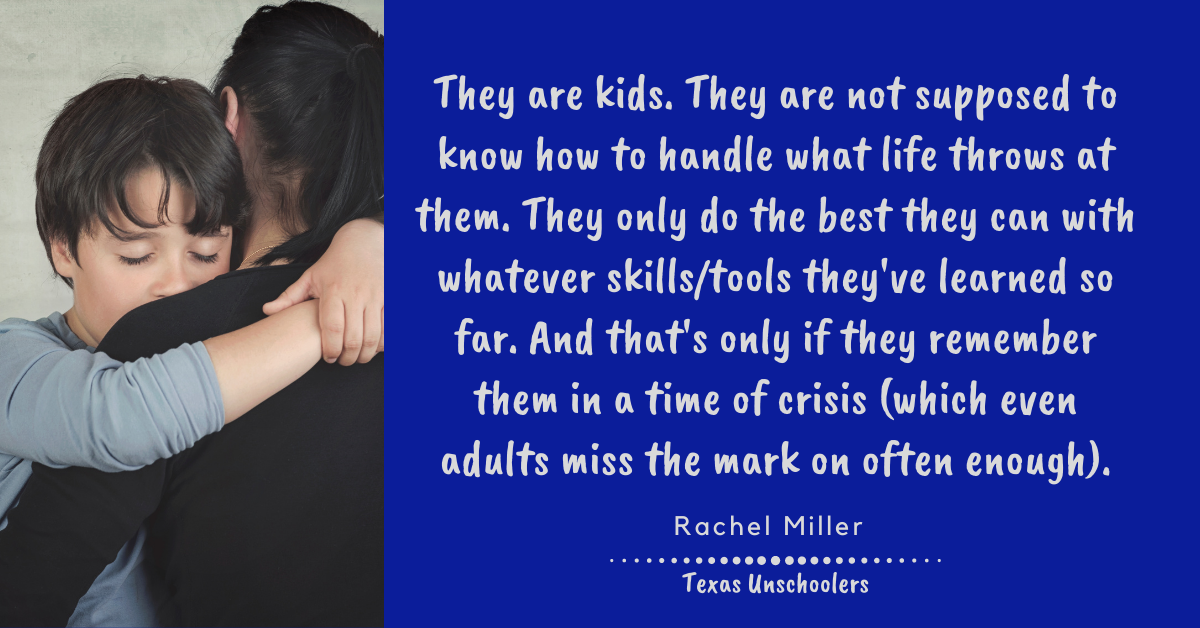A common Unschooling question, especially lately, is “What do I do when my child is having a hard time?” or “How do I respond when they’re melting down?”
It’s so hard to see our kids struggling. It helps me keep calm to remember some things when our kids are having a hard time:
A. They are kids. They are not supposed to know how to handle what life throws at them. They only do the best they can with whatever skills/tools they’ve learned so far. And that’s only if they remember them in a time of crisis (which even adults miss the mark on often enough).
B. Me freaking out/panicking/yelling/telling them to stop/calm down is NOT going to help anyone.
It depends on the kid, the situation, their own triggers, my triggers, etc. Here are some things that can help:
1. Asking them, “Do you want me to do anything – or do you just want to vent?”
If they opt to vent: Safety first. I only physically move them if it’s an immediate danger to themselves or someone nearby. (laying down in the middle of the road) In a case of self-harm I offer options of a physical outlet. “Your body looks like it needs to express frustration – would you like to punch this pillow, stomp your feet, walk around the block, do jumping jacks, etc.?”
“Would you like to sit in my lap/hold my hand/go someplace else?” (not a punishment or forced “banishment” way but in an escape from people/noise/light/surroundings kind of way – like to the car, their room or mine, a closet, etc.).
I may ask again later once they’ve had some time. “Would you like to look over what happened and brainstorm some ideas to perhaps prevent what happened or ways to try it differently or ???”
2. Remember, when they’re extremely stressed – it’s generally “Fight or Flight” that’s kicking in. Notice no part of “have respectful/meaningful conversation” fits under either the category of Fight or Flight. You can give soothing words, sounds, etc. However they are not always going to respond well to suggestions and it’s doubtful they’ll process them, remember them, or have them as tools next time. So brainstorming will need to wait for later. And probably be discussed more to be “available” for applying in the future.
3. It’s OK to be disappointed. It’s OK to be stressed. It’s OK to “fail”. It’s OK for things not to go our way. Acknowledging those emotions and giving them the space & time to have them is not a bad thing.
4. 2020 SUCKS. Big time. This has been the absolutely craziest year. Even if our kids don’t seem directly impacted by ALL. THE. THINGS. They are definitely picking up on the emotions and uncertainty of all those around them. As adults, we have a lot of life experience to draw from & freedom to try to cope (even so a LOT of us are also scrambling to pick up new skills during these unprecedented times). Grace for your kids. Grace for yourself.
This loops back to A. and number 3 – I acknowledge when things are crazy to the kids. “Hey, we’re encountering a new situation – even I don’t know how to handle it well. Let’s work together to find some ideas/solutions and try those out and see if they help.”
5. Sort of connects to A. We, as their parent/trusted adult are learning our kids as well. Each time something happens – we have more “parenting data” to work with. Now, I often know which kid is going to be impacted in what way by what situations. I’ve had 17 & 15 years to learn these things. That said, we STILL encounter new situations.
At 2, 3, 4, and when they hit new milestones or were out encountering lots of new things – there were definitely a LOT more instances of them struggling with life. Each situation, age, & stage is an opportunity to gather more data. My goal is to continually pass that data and those coping skills along to them so they can try to apply it in their own lives now and as adults.
-Rachel
Learn more about Rachel on our Contributors page.


